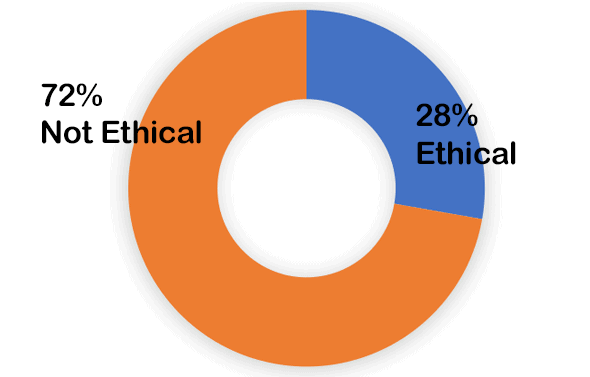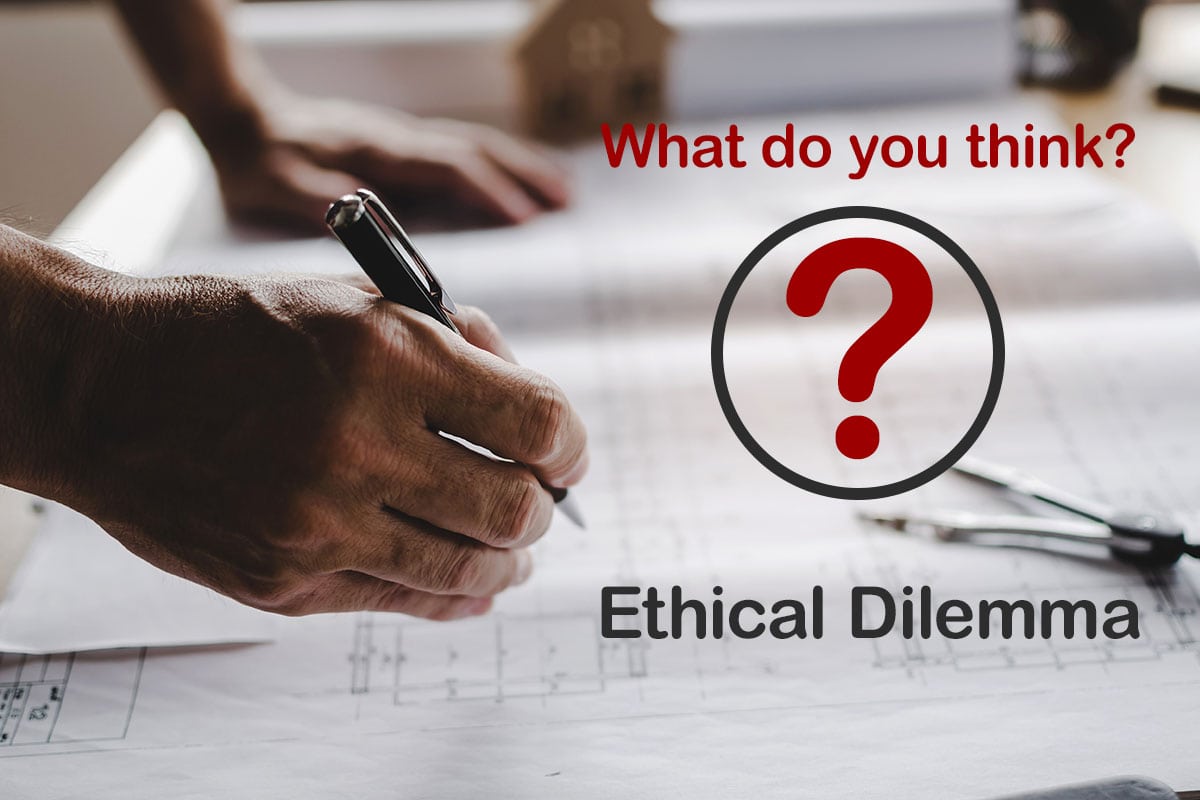This is the June 2020 edition of our monthly series of Ethics case studies titled What Do You Think? This series is comprised of case studies from NSPE archives, involving both real and hypothetical matters submitted by engineers, public officials and members of the public.
Your peers and the NSPE Board of Ethical Review have reviewed the facts of the case as shown below. And, here are the results.
Your opinion has been registered for the June 2020 edition of our monthly series of Ethics case studies titled What Do You Think?
Your vote is recorded as:

Want to know how your peers voted? We’ll send you an email with the poll results on June 23.
Your opinion has been registered for the June 2020 edition of our monthly series of Ethics case studies titled What Do You Think?
Your vote is recorded as:

Want to know how your peers voted? We’ll send you an email with the poll results on June 23.
A Review of the Facts
Engineer Beth is retained by Client X to prepare plans and specifications for the construction of a commercial facility. Beth prepares the plans and specifications and delivers them to Client X, who submits them to the public building authority for approval. Client X fails to pay Beth for the work performed. Thereafter, Client X sells the land upon which the commercial facility is to be constructed to Purchaser Y. Purchaser Y obtains a copy of the plans and drawings from the public building authority and then asks Engineer Scott to review, re-seal and resubmit the plans and drawings prepared by Beth for review and approval by the public building authority. Scott is aware that Beth was never paid for her services, but agrees to to review, re-seal, and resubmit her work.
Was it ethical for Scott to agree to review, re-seal and resubmit the plans and drawings prepared by Beth for review and approval by the public building authority?
Here is the result of our survey of your peers:

Applicable NSPE Code References:
Code III.1: Engineers shall be guided in all their relations by the highest standards of honesty and integrity.
Code III.6: Engineers shall not attempt to obtain employment or advancement or professional engagements by untruthfully criticizing other engineers, or by other improper or questionable methods.
Code III.9: Engineers shall give credit for engineering work to those to whom credit is due, and will recognize the proprietary interests of others.
Discussion
Although the facts of BER Case 64-7 differ from this case, it reinforces that each engineer has an ethical obligation to recognize and give credit to the creative products of other engineers. In BER Case 64-7, a professional engineer employed as an assistant sanitary engineer was solely responsible for the signing off of his designs, without oversight from his supervisor. Although each case must be decided upon its individual facts, as no two cases are alike, certain basic obligations exist that must be recognized in all cases.
BER Case 83-3 similarly involved Engineer B, who submitted a proposal to a county council following an interview concerning a project. The proposal included technical information and data requested by the council as a basis for the selection. Smith, a staff member of the council, made Engineer B’s proposal available to Engineer A, who then used it, without consent, to develop their own proposal that was subsequently submitted to the council. The extent to which Engineer A used Engineer B’s information and data was a subject of dispute between the parties. In determining that Engineer A’s actions were unethical, the Board indicated that, at a bare minimum, ethical obligation includes securing the consent of another engineer when one intends to reproduce a creation of that engineer without specifying their identity, and in some cases providing the engineer with remuneration for their work depending upon the surrounding circumstances.
In the present case, Scott agreed to review, re-seal and resubmit the plans and drawings prepared by Beth for review and approval by the public building authority, knowing that Beth had not been paid either by Client X or Purchaser Y for the service rendered. The plans and drawings included technical information and data not prepared by Scott. There does not appear to be any question or dispute as to the extent to which Scott used Beth’s information.
However, Scott using the information in this manner suggests a violation of Code III.9. of the Code of Ethics. Although it may be argued that the Code provision is meant to address situations where a supervising engineer fails to give credit to an employee responsible for a particular design, we are convinced that the Code may properly be read to imply use applicable to Beth’s case, and thus proscribe the conduct of Scott. Scott had an obligation to (1) seek and obtain Beth’s consent before using the plans as a basis for one’s own services; (2) if granted consent, identify Beth in all cases of use of Beth’s work; and (3) negotiate and pay Beth “fair and reasonable” compensation for using the work. By failing to fulfill any of those obligations, Engineer B clearly violated Code III.9.
Additionally, Code III.1 states that Engineers “shall be guided … by the highest standards of integrity.” Integrity includes “soundness of moral principles, as firm adherence to a code of moral values (Black’s and Webster New Collegiate). Can being a knowledgeable party to such an unfair use of another’s work be morally acceptable?
The actions of Scott are unbecoming of a professional engineer. When offered the contents of Beth’s work by Purchaser Y, Scott had an ethical obligation to refuse to accept the plans. Instead, Scott accepted and also used the material. Because of the decision to actually use the plans, we must further conclude that Scott violated Code III.6 by competing unfairly with Beth by attempting to “obtain advancement by improper or questionable methods.”
The Ethical Review Board’s Conclusion

It was unethical for Scott to agree to review, re-seal and resubmit the plans and drawings prepared by Beth for review and approval by the public building authority.
BOARD OF ETHICAL REVIEW
James G. Fuller, P.E., Donald L. Hiatte, P.E., William W. Middleton, P.E., Robert L. Nichols, P.E., William E. Norris, P.E., Jimmy H. Smith, P.E., William A. Cox, Jr., P.E., Chairman
Note: The Board of Ethical Review operates on an “ad hoc” educational basis, and does not engage in resolving disputes of fact between parties in actual cases. That function is left to the state society if members are involved in judging whether a member has violated the Code of Ethics. Being solely educational, the function of the Board is to take the submission of “facts” as the basis for analysis and opinion without attempting to obtain rebuttal or comment from other parties. On that basis, the reader of the opinions should always recognize that the Board of Ethical Review is not an adjudicatory body, and unless indicated otherwise, its opinions are not binding upon the National Society of Professional Engineers, any state engineering society or any individual. Instead, the opinions represent the opinions of licensed engineers as to the reasonable standards of practice within the engineering profession. Board of Ethical Review opinions are intended to provide guidance in actual cases only to the extent of the “facts”, stated in the case. Cases may be reproduced for educational purposes as long as the material reproduced provides appropriate attribution to NSPE and the Board of Ethical Review.








Ethics are one thing like being polite. Stealing another persons intellectual efforts are another thing and is not illegal if not confined by a legal contract or copyright. You are assuming some level of professional respect. Isn’t happening in this day and age. Sorry, it is cut throat out there and this happens all the time.
I have seen a lot of CAD drawings where boiler plate from technical manuals such as the Wood Frame Construction Manual and NDS are included as pages in the plans. It is not clear to me that Wood Frame Construction Manual and NDS have been payed royalties by the CAD creator, or the engineer using the boiler plate. I would be interested in hearing from your ethical gurus on this one.
since the parties were not identified until the end of the summary, i am not sure as to the relationship between scott and beth. i have to assume that beth did not work for scott and if this is true, i am not sure haw the statement about how supervising engineers not giving credit to subordinated would apply. in my experience junior engineers in a firm are not allowed to practice “off the books” or in moonlighting situations since this affects the liability for the firm.
therefore i have to believe this is a simple case of one engineer taking credit and fee for anothers work.
it would however be a good opportunity to cover the rules for review and adoption of prototype plans and specs for construction
also how the rules might differ from state to state
Had the plans been paid for would they not have been the property of Client X? Code III.9 requires Scott to “recognize the proprietary interests of others.” Once paid, does Beth have any remaining proprietary interest? Would Scott have been acting ethically then?
I never seal or stamp another engineer’s work. I do not have any knowledge as to way he or she made design decisions and am not qualified to pass judgment on them. If any are in error I am held responsible for them. My insurance company would cancel my policy if they found out I had sealed someone else’s work.
Forgive me this PE from 1975, but did Scott do the original work? Did Beth do the work and did she seal it as her work? Was Beth contractually employed by Scott? If the answer to Q1 is NO, Q2 is YES and Q3 is NO then it is NOT his work and he has no right to Seal it as his! (As well as get paid for it!) Do we need to take the BS 1 hour engineering ethics course to see this??
Yes, Augustine, Beth has a proprietary interest and under the original Board Rules for the State of Texas, before the merger with the R.P.L.S. group, Scott would have been required to note on the plans what work he did and what work Beth did. He would also have been required to notify her of the use of her plans. This all is based on Beth having been paid. The bad part of all of this, including the boiler plate mentioned above about Cad files , is when electronic files of plans are revised by another entity and your electronic seal is left on them, as if the design was yours!!!!! happened to me by a Federal agency. Fortunately, a supervising architect notified me of this and I threatened a personal lawsuit by personnel of the offending agency.